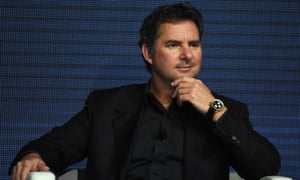Extract from The Guardian
News comes week after Larry Marshall announced shift in research
priorities from understanding nature of climate change to adaptation and
mitigation


CSIRO chief Larry Marshall has provided more details on cuts to climate monitoring and modelling at the CSIRO – confirming that the number of researchers employed in two research programs would be halved.
In Senate estimates on Thursday, under questioning from Labor’s Kim Carr, Marshall said 100 jobs would be cut from the oceans and atmosphere program . He said they would hire another 35 people, leaving an overall loss of 65 people.
As a result of the cuts, Marshall confirmed that the number of people working on monitoring and modelling climate change would be cut in half.
The news comes one week after Marshall announced, in an email to staff, that there would be a shift in research priorities, away from understanding the nature of climate change, and towards adaptation and mitigation.
The announcement was quickly condemned by scientists around the world, and, unusually, by the World Meteorological Organisation, which is part of the UN.
Asked about the international criticism, Marshall said he was surprised, particularly by the criticism from the US, which he said had already led a similar shift in research priorities.
“It’s a matter of fact that the United States invests 75% of its dollar investment into the environmental area into mitigation and only 25% into modelling and monitoring,” he said.
“Over the last decade, the investment in the US in modelling and measuring has changed hardly at all – roughly 4% a year, while in contrast, the investment in mitigation technologies has changed 40% a year.”
“Given the US is playing a lead in a major shift in research priorities, this was a big part of our thinking of following that leading trend. So it surprised me to be criticised by someone who had led that trend.”
Tony Haymet from Scripps Institution of Oceanography in the US said any suggestion the US was scaling back its research into measurement and observation was wrong. He said there were some large-scale investment in mitigation technologies like carbon capture and storage, but they often weren’t successful.
“I certainly think we need to invest more in mitigation but it’s not either or,” Haymet said. “We don’t know perfectly what we need to mitigate against so we need to do both.”
Marshall also apologised for his statements made on the ABC on Thursday morning, when he compared the criticisms of the cuts to the lobbying by the fossil fuel industry against climate researchers in the 1970s.
“There’s a lot of emotion in this debate – in fact it almost sounds more like religion than science to me,” he said earlier on the ABC.
Senator Carr had asked Marshall if he was aware the comparison was used by climate change deniers and was uttered by former prime minister John Howard.
“I apologise for any offence I made to anyone with my reference to religion,” he said.
“It was a poor way of expressing the passion with which people feel about this,” Marshall said.
In Senate estimates on Thursday, under questioning from Labor’s Kim Carr, Marshall said 100 jobs would be cut from the oceans and atmosphere program . He said they would hire another 35 people, leaving an overall loss of 65 people.
As a result of the cuts, Marshall confirmed that the number of people working on monitoring and modelling climate change would be cut in half.
The news comes one week after Marshall announced, in an email to staff, that there would be a shift in research priorities, away from understanding the nature of climate change, and towards adaptation and mitigation.
The announcement was quickly condemned by scientists around the world, and, unusually, by the World Meteorological Organisation, which is part of the UN.
Asked about the international criticism, Marshall said he was surprised, particularly by the criticism from the US, which he said had already led a similar shift in research priorities.
“It’s a matter of fact that the United States invests 75% of its dollar investment into the environmental area into mitigation and only 25% into modelling and monitoring,” he said.
“Over the last decade, the investment in the US in modelling and measuring has changed hardly at all – roughly 4% a year, while in contrast, the investment in mitigation technologies has changed 40% a year.”
“Given the US is playing a lead in a major shift in research priorities, this was a big part of our thinking of following that leading trend. So it surprised me to be criticised by someone who had led that trend.”
Tony Haymet from Scripps Institution of Oceanography in the US said any suggestion the US was scaling back its research into measurement and observation was wrong. He said there were some large-scale investment in mitigation technologies like carbon capture and storage, but they often weren’t successful.
“I certainly think we need to invest more in mitigation but it’s not either or,” Haymet said. “We don’t know perfectly what we need to mitigate against so we need to do both.”
Marshall also apologised for his statements made on the ABC on Thursday morning, when he compared the criticisms of the cuts to the lobbying by the fossil fuel industry against climate researchers in the 1970s.
“There’s a lot of emotion in this debate – in fact it almost sounds more like religion than science to me,” he said earlier on the ABC.
Senator Carr had asked Marshall if he was aware the comparison was used by climate change deniers and was uttered by former prime minister John Howard.
“I apologise for any offence I made to anyone with my reference to religion,” he said.
“It was a poor way of expressing the passion with which people feel about this,” Marshall said.
No comments:
Post a Comment